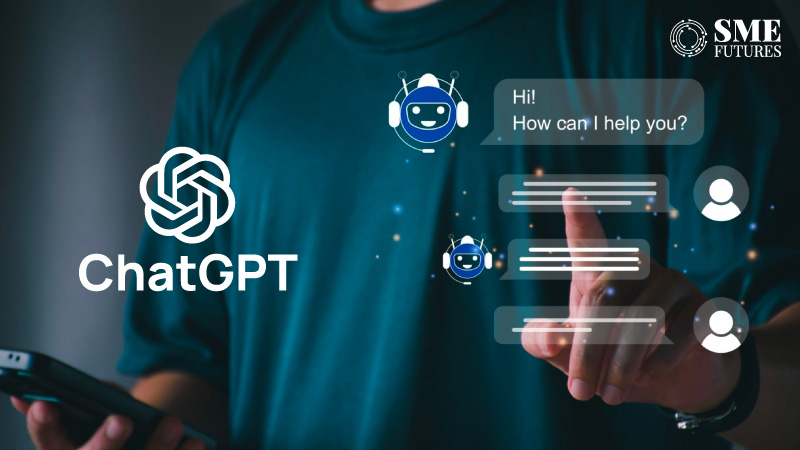ChatGPT has caused an internet blizzard. Within one week of its launch, OpenAI’s chatbot broke all records, surpassing one million users.
Just digest this. A UBS study reveals that TikTok took nine months to hit 100 million monthly active users and Instagram took 2.5 years to do the same. While an average of about 13 million unique visitors had used ChatGPT per day in January, more than double the levels of December. This is just one month’s data; its popularity is growing beyond anybody’s imagination.

According to UBS analysts, ChatGPT’s estimated 123 million monthly unique visitors points to a 116 per cent month-over-month growth, which is equivalent to 14-year-old Bing’s December’s unique visitors.
“In twenty years of following the internet space, we cannot recall a faster ramp in a consumer internet app,” they write.
TBH, this is not an original idea. But everyone has their own opinion about ChatGPT, AI and its usage in our lives. Engineers and tech evangelists especially are going all gaga over it.
Microsoft Chairman & CEO, Satya Nadella talked about how it was helping rural Indians when they were trying to access some government programmes. Many see enormous possibilities in this language machine that uses data, supervised learning and unreal intelligence.
Also Read: Post-pandemic, NBFCs are rebounding, says Raul Rebello, Mahindra Finance
For instance, leveraging GPT-3 can generate quizzes to tutorials, acting as a virtual teacher. So, there are some potential use cases.

ChatGPT will most certainly contribute to lowering the barrier of entry for anyone who is not a professional in fields such as coding and content writing.
At the same time, it will also raise the ceiling of output for those who are already skilled in those functions. Since this programme can remember the history of conversations through contextual carryover, it offers users a fluid conversational experience, allowing for follow-ups to correct the responses where necessary. Furthermore, with ChatGPT, the language generation is controlled to a large extent.
Recently, fascinated with this state-of-the-art language model, a home-grown organisation called CS India (Chhatra Sansand), which aims to increase the socio-political awareness of the youth, took a bold step.
It appointed ChatGPT as its new CEO.
Does it even make sense, making an AI programme a Chief Executive Officer!? But for CS India’s founder it totally does. According to Adv. Kunal Sharma, Founder-CEO of CS India, this appointment marks a major milestone for them and in the field of AI, as it is one of the first organisations in the world to appoint an AI-powered CEO.
“ChatGPT is the perfect candidate to lead our organisation in this mission, as its advanced language processing capabilities and its ability to analyse vast amounts of data make it well-suited to drive our efforts to empower the youth of India through leadership and development,” he says.
Also Read: How AI chatbots like ChatGPT are transforming service desks for SMEs
ChatGPT, as CEO, will be overseeing CS India’s day-to-day operations as well as driving its growth and expansion. ChatGPT will use its advanced language processing skills to analyse market trends, identify new impact opportunities, and develop strategies to improve young people’s leadership and development in India.
This is one way to put it.
But there’s a lot going on behind the scenes. For starters, ChatGPT has started a battle for search engine dominance.
What’s at stake?
$400 billion.
Just look at these numbers. According to Statista estimates, global search advertising revenue amounted to $260 billion last year and could climb to $400 billion by 2026.

But the release of openAI’s ChatGPT which is working closely with Microsoft, has generated a lot of chaos in the tech world, especially within the big tech giants like Google who are in the search engine business.
On 7th February, another Microsoft announcement clearly spells out for us how the search business dynamics could change in the coming times. Satya Nadella announced the launch of the new Bing search engine and the Edge browser, both running on a next-generation OpenAI model that is “more powerful than ChatGPT” and is customised specifically for search.
“AI will fundamentally change every software category, starting with the largest category of all – search,” Satya Nadella said in a statement, calling the AI-powered versions of the new Bing search engine and the Edge browser “an AI co-pilot for the web.”
With this, Microsoft’s wants to do big things in this arena, even as many point out that it will barely be able to scratch Google’s back. However, as technology advances and ChatGPT grows in popularity, the scenario could change. After all, we’ve all heard about what happened to Nokia.
Also Read: Govt grants Rs 242 crore to IIT-M to encourage lab grown diamond production
$400 bn is a big figure and loosing even an iota of it would lead to massive losses. Google wouldn’t want that, right?
Will ChatGPT cause an increase in cyberattacks?
As ChatGPT continues to fascinate the online world, we cannot afford to ignore the security aspect of the same. This is another question that has engendered a lot of discussions amongst technology mavens.
“ChatGPT is an interesting experiment at the moment, but its wider availability certainly appears to present new challenges,” says Chester Wisniewski, Field CTO, Applied Research at Sophos who has been playing with it since its public availability in November of 2022.
“It is quite easy to convince it to assist with creating very convincing phishing lures and responding in a conversational way that could advance romance scams and business email compromise attacks,” he adds.
OpenAI seems to be trying to limit the high-risk activities that could damage its credibility, but the cat is now out of the bag.
“Today the biggest risk is to English speaking populations, but it is likely only a matter of time before it is available to generate believable text in the most commonly spoken languages in the world. We have reached a stage where humans are unlikely be able to discern machine generated prose from human prose which has been written during casual conversations with those that they are not intimately familiar with. A lot of security filters will be required to prevent humans from being victimised,” he asserts.
According to a BlackBerry survey, more than half (51 per cent) of IT decision makers believe that a successful cyberattack will be attributed to ChatGPT in less than a year. The survey says that nearly 71 per cent believe that foreign states are already using the technology for malicious purposes against other countries.
Approximately 49 per cent believe that it will enable less experienced hackers to improve their technical knowledge, develop more specialised skills, and spread misinformation.
“ChatGPT’s influence in the cyber industry will grow over time,” says Shishir Singh, BlackBerry’s Chief Technology Officer, Cybersecurity.
Is ChatGPT good enough to solve real biz issues?
This one is also a predictable question. How are businesses going to use it to solve their operational issues?
Discussing ChatGPT’s usefulness in business, Jaya Kishore Reddy Gollareddy, CTO and Co-founder of Yellow.ai says, “ChatGPT can only fetch info and respond to the user’s prompts based on the knowledge fed to it during its training. But it lacks the ability to perform a relevant action or integrate with backend systems. For it to perform an action like fetching policy details or booking a flight, it needs access to third-party systems.”
“Not only that, but each business is also distinct in nature; they have their own domain knowledge and sources that are very specific to their products and services and to the industry they operate in. For them to leverage ChatGPT, they would need to access the API to fine-tune ChatGPT with their own data and create their own variants of ChatGPT,” he further points out.
Besides that, businesses need to have control over the conversational flows, intents, and utterances. “There is still ground to cover in order for ChatGPT to be used effectively and accurately for enterprise use cases to solve real business problems at scale,” Golareddy adds.
This indicates that firms would require an additional budget to achieve all this.
Leena AI, an employee engagement software company answers this question by its own example. This company has recently integrated GPT-3 to enhance its end-user experience.
Also Read: RBI-MPC may hike repo rate again in April: Acuite Ratings
Adit Jain, Co-founder and CEO of Leena AI says, “OpenAI’s ChatGPT has kicked off an innovation race that will accelerate technological developments much faster than before. Now customers can channel the power of GPT-3 in an enterprise-ready, secure framework with Leena AI.”
According to the company, this integration will help reduce the number of unanswered employee queries, improving the overall end-user experience of interacting with the dashboard. Overall, it will increase the efficiency of the whole suite.
Is this a new marketplace?
Now it’s an open field.
ChatGPT has ushered in a digital revolution. Google, not wanting to be left behind is already working on its chatbot—Bard. While the battle between the two tech giants intensifies, the general opinion is that now tech corporations are under pressure to do more. This will create a new market landscape.
For instance, WhatsApp could become the major search engine to integrate ChatGPT for a national level program for farmers in partnership with MeitY. They are currently developing a chatbot for WhatsApp that uses data from ChatGPT to return pertinent answers to questions.
At the same time, while many start-ups are experiencing a funding winter, it seems like the VCs have now got another playing field to bet their moolah on. This could also be a huge opportunity for start-ups to explore the possibilities that this technology presents. Not to forget that there will be a change in the dynamics of tech jobs as well—they will be upgraded.
However, all said and done, it’s still too early to talk about the future of ChatGPT and the other chatbots like it as the tech world continues to come up with new technological marvels at an exponential speed. There’s so much to explore on the topic, so we will continue to write on it. Meanwhile you can comment on this article and share it amongst your peers.










